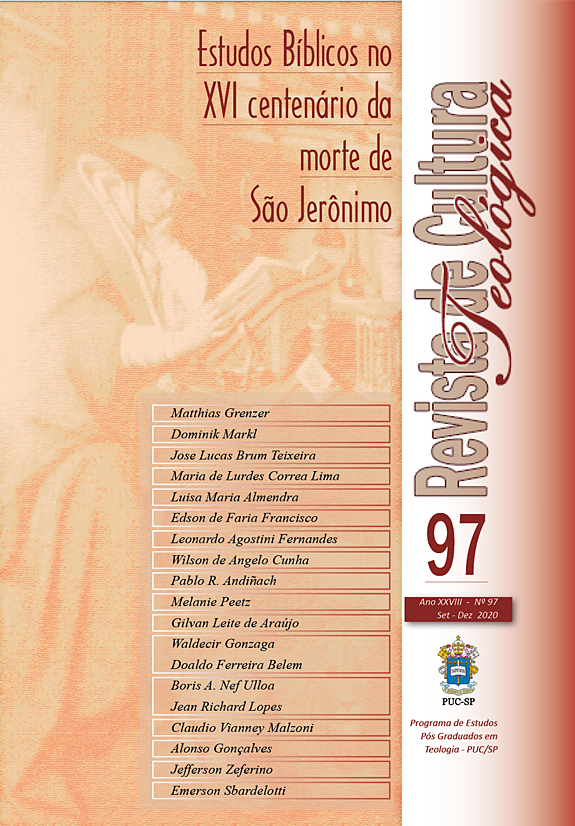Traduzir a Bíblia: “...a impossibilidade de dizer”
DOI:
https://doi.org/10.23925/rct.i97.50990Resumo
Desde São Jerónimo que a Bíblia Hebraica, ou partes dela, foi traduzida em quase dois mil idiomas e, em algumas línguas, a tradução prolifera em dezenas de versões. Esta realidade permitiu um acesso quase universal ao texto, porém estabelecendo, em muitos casos, uma distância tremenda com a língua original, as suas características e tonalidades e a verdade do seu dizer. Se existe algo de positivo neste movimento recente ele parece situar-se apenas na diversidade dos vários contributos de conhecimento para a compreensão do texto bíblico e do seu significado que ele permitiu. O debate recente obriga a que estes contributos se entendam como porções diferentes de uma verdade indizível; que resultam de diferentes métodos de tradução, que alguns acusam ser responsáveis por mudar o verdadeiro rosto das próprias Escrituras. Este artigo procura rever este debate procurando situar as fragilidades das tentativas literais e das que arriscam oferecer um lugar ao sentido, defendendo que estas duas tentativas, embora opostas, têm trabalhado uma confluência construtiva. Os desafios persistem e são, por vezes insuperáveis, mas o caminho permanece aberto nas perspetivas e as opções atuais.Referências
ALTE, R. – KERMODE, F. (eds.). The Literary Guide to the Bible. Cambridge: Harvard University Press, 1987.
ALTER, R. The Art of Biblical Narrative, New York: Basic Books, 1981).
BARTHES, R. S/Z. An Essay (New York: Hill & Wang, 1974).
BENJAMIN, W. The Task of the Translator, Illuminations, New York: Schocken, 1969.
de WAARD, J. - NIDA, E.A. From One Language to Another: Functional Equivalence in Bible Translating. Nashville: Thomas Nelson, 1986.
FISHBANE, M. Text and Texture. New York: Schocken, 1979.
FRETHEIM, T. The Book of Genesis. Introduction, Commentary, and reflections, The New Interpreter’s Bible I. Nashville: Abingdon Press, 1994.
FOX. E. In the Beginning. New York: Schocken Books, 1983.
GREENSTEIN, E.L Essays on Biblical Method and Translation. Atlanta Scholars: Press, 2020.
GROS, L., – ACKERMAN, J.S. (eds.). Literary Interpretations of Biblical Narratives, Volume II. Nashville: Abingdon Press, pp. 124-125, 1982.
HALLO, W. Notes on Translation. Eretz Israel, 16, p. 99, 1982.
HOBERMAN, B. Translating the Bible. The Atlantic Monthly, pp. 43-58, February 1985.
LEFEVERE, A. Programmatic Second Thoughts on 'Literary' and 'Translation'. Poetics Today 2/4 Summer/Autumn, 1981, pp. 39- 50.
NIDA, E.A. – TABER, Ch.R. The Theory and Practice of Translation. Leiden: E. J. Brill, 1974.
KRAMER, S.N. The 'Babel of Tongues': A Sumerian Version, JAOS, 88, pp. 10-11, 1968.
OPPENHEIM, L. Can These Dry Bones Live? - An Essay on Translating Akkadian Texts. Letters from Mesopotamia. Chicago: University of Chicago Press, 1967.
ORLINSKY, H.M. Lectures on "Male Oriented Language in Bible Translation, in The Baltimore Sun, Nov. 15, 1977, and in Johns Hopkins Magazine, March 1978, pp. 47-48.
PRICE, R. A Palpable God: Thirty Stories Translated from the Bible with an Essay on the Origins and Life of Narrative, New York: Atheneum, 1978.
ROBERTSON, E.H. The New Translations, The New Translations of the Bible. Naperville, IL: Alec R. Allenson, 1959.
SASSON, J.M. Ruth: A New Translation with a Philological Commentary and a Formalist-Folklorist Interpretation. Baltimore: Johns Hopkins University Press, 1979.
SCHLEIERMACHER, F., "On the Different Methods of Translation,", in A.L. Willson (ed.) (New York: Continuum. 1982) p. 9.
STEINER, G. A Friendship and Its Flaws (A Review of Walter Benjamin-Gershom Scholem Briefwechsel...), The [London) Times Literary Supplemen, nº 4031 (June 27. 1980), p. 723.
STEINER, G., After Babel: Aspects of Language and Translation. London: Oxford University Press, 1975.
STEM, D., "Translating the Ancients," Commentary 59/6 (June 1975), esp. p. 45
TABER, Ch.R., Translation as Interpretation. Interpretation, 32, p. 131, 1978.
Publicado
Como Citar
Edição
Seção
Licença
Copyright (c) 2020 Revista de Cultura Teológica

Este trabalho está licenciado sob uma licença Creative Commons Attribution-NonCommercial-NoDerivatives 4.0 International License.
Os autores concedem à revista todos os direitos autorais referentes aos trabalhos publicados. Os conceitos emitidos em artigos assinados são de absoluta e exclusiva responsabilidade de seus autores.

